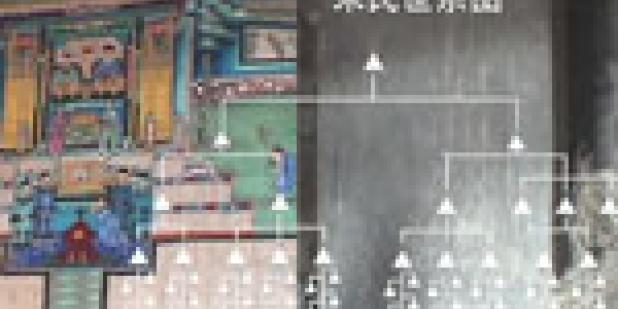Happy Lunar New Year from the USC US-China Institute!
Cultural Dimensions of Visual Ethnography: U.S.- China Dialogues
The USC US-China Institute and the USC Center for Visual Anthropology present a symposium featuring the screening of several ethnographic films and extensive discussion of visual ethnography by Chinese and American scholars, documentary filmmakers and new media practitioners.
Where

PLEASE RSVP TO JIA TAN AT jiatan@usc.edu
Challenging an older model in which Euro-American filmmakers documented Asian ethnography, this conference would look comparatively at Chinese and American sites of visual ethnography production, and examine the cultural dimensions of filmmaking. A keynote speaker will frame the critical issues involved in these discussions, and lay the groundwork for the comparative evaluation of strategies for observing, recording, editing and framing ethnographic documentaries.
How has visual ethnography shifted from becoming a discipline of “first world” filmmakers traveling to film “third world” people to a more complex and dialogical series of exchanges? Moving away from this bi-polar perspective to see the world in more complex and subtle terms, how have the audience for ethnographic documentaries shifted in recent years? How are ethnographic documentaries influenced by controversies about minority nationalities and ethnicity? What is the relationship between visual ethnography and the commercial videos produced for tourism promotion? What is the role of autobiographical or first person documentaries in defining a cultural perspective? What role do videos play in maintaining transnational connections among dispersed families and communities in China and the US? How do websites and web-based blogs serve to maintain transnational ties?
Thursday April 8
12:00 pm Welcome and Reception at the University Club
1:00 pm Opening Remarks: Janet Hoskins, Gary Seaman, Nancy Lutkehaus
![]() 1:30-2:30 pm
1:30-2:30 pm
Opening lecture: “Ethnography, Ethnographic Film, & Religious Revival in Contemporary China” Mayfair Yang, UCSB
Discussion
3:15-3:30 pm Coffee break
3:30- 5:00 pm
Student panel: Body, Self and Identity
Jia Tan, USC Cinema
JP Sniadecki Harvard Anthropology
Fei-Mei Heberer USC, Cinema
Leavey Screenings (at Leavey Auditorium):
5:30 pm

“Broken Pots, Broken Dreams” by Maris Boyd Gillette (30 minutes)
To view the trailer, please click here.
6:20 pm
 “The Secret of the Stone” by Zhifang Song, Gary Seaman & Steven Schindler (39 minutes)
“The Secret of the Stone” by Zhifang Song, Gary Seaman & Steven Schindler (39 minutes)
To view the trailer, please click here.
Q and A with the filmmakers
Friday April 9
8:30 am Coffee and breakfast served at the Anthropology lounge
Morning Panels: Grace Ford Salvatori Auditorium 106
9:15 am First Panel: Ethnic Minorities and Cinematic Representation
 Papers presented by Professor Dru Gladney of Pomona College and the Pacific
Papers presented by Professor Dru Gladney of Pomona College and the Pacific
Bassin Institute and Professor Yang Hui of Yunnan University
Discussants: Stan Rosen, USC and Kenneth Dean, McGill University
10:30 am Coffee break (Anthropology Lounge)
10:45 am Second Panel: Community-Based Documentary and Participatory Cinema
Papers presented by Wu Wenguang of Beijing and Kenneth Dean of McGill
Discussants: Eugene Cooper, USC Anthropology and Louisa Schein, Rutgers
12:00 noon Lunch Break
Lunch will be served in Gabilan Courtyard
Leavey Afternoon Screenings:

1:00 pm “Tiger Day” by Zhuang Kongshao (20 minutes)
Warning: There are some graphic scenes depicting the slaying of animals in this film that viewers may find offensive or disturbing. It is not a film suitable for children.

1:30 pm "A Buyei Priest" by Deng Qiyao (38 minutes)
Q and A with the filmmakers
2:30 pm “Through Chinese Women’s Eyes” by Mayfair Yang (52 minutes)
Q and A with the filmmaker
3:40- 4:00 pm Coffee Break Gabilan Courtyard
![]() 4:00 pm
4:00 pm
Wu Wenguang and Deng Qiyao
“My Village: The Villagers Documentary Project” (60 minutes)
To view the trailer, please click here.
Q and A with Wu Wenguang and Deng Qiyao
 5:30 pm
5:30 pm
Keynote Speaker: Louisa Schein of Rutgers University
“Genres Unbound: Transnational and Grass Roots Media Perforating the Chinese Ethnographic"
Saturday April 10
9:00 am Coffee and breakfast served at Gabilan Courtyard
Morning Panels: Leavey Auditorium
9:15 am Third Panel: Using Film in Teaching Anthropology
Papers by Zhuang Kongshao and Scott Wilson/Zhifang Song
Discussants: Gary Seaman of USC and Stephen Schindler of CSULB
10:30 am Coffee break at Gabilan Courtyard
10:45 am Fourth Panel: Visual Ethnography and Folklore in the Digital Age
Papers by Deng Qiyao of Beijing and Maris Boyd Gillette of Haverford College
Discussants: Michael Renov of USC Cinema and Meiling Cheng of USC
School of Theater
12:00 noon Lunch Break
Lunch will be served at Gabilan Courtyard
Leavey Afternoon Screenings:
1:00 pm “Bored in Heaven” by Kenneth Dean (70 minutes)
Q and A with Kenneth Dean, McGill University

2:15 pm “Bing Ai” by Feng Yan (120 minutes)
For more information about the filmmaker, please click here.

4:45 pm “A Dai Village’s New Year” by Yang Hui (44 minutes)
 5:30 pm SATURDAY NIGHT SPECIAL:
5:30 pm SATURDAY NIGHT SPECIAL:
”Han Xin’s Revenge: A Daoist Mystery”. (90 minutes)
A film by Patrice Fava with the participation of Zhuang Kongshao
Discussants: Kenneth Dean, McGill University, Mayfair Yang, UCSB
Sunday April 11
Morning Business Meeting: The Bohannon Anthropology Seminar Room, AHF B108, Hancock Building, Basement)
9:00 am Coffee and breakfast
9:15 am Discussion of plans for publishing an edited volume on “Digital Media,
Cultural Lenses: Visual Ethnography Dialogues with China”
For more info please visit the "Cultural Dimensions of Visual Ethnography" webpage.
Featured Articles
We note the passing of many prominent individuals who played some role in U.S.-China affairs, whether in politics, economics or in helping people in one place understand the other.
Events
Ying Zhu looks at new developments for Chinese and global streaming services.
David Zweig examines China's talent recruitment efforts, particularly towards those scientists and engineers who left China for further study. U.S. universities, labs and companies have long brought in talent from China. Are such people still welcome?






